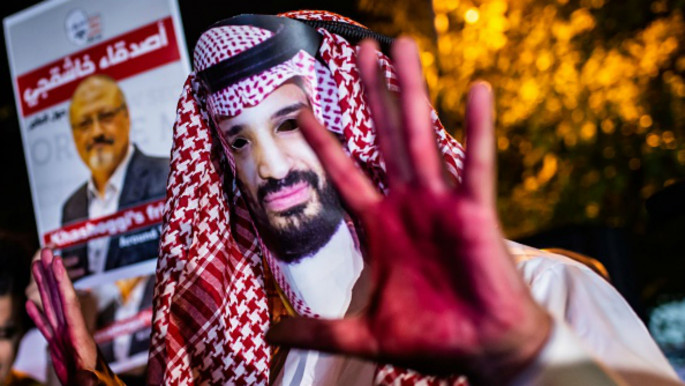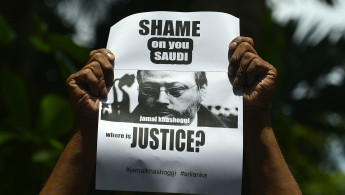Jamal Khashoggi's murder: From immunity to impunity
Jamal Khashoggi's murder: From immunity to impunity
The murder of Jamal Khashoggi has raised questions about diplomatic immunity and the risk of actors abusing this system to carry out criminal activities.
6 min read
Jamal Khashoggi was murdered in the Saudi consulate in Istanbul [Getty]
On October 2, 2018, Jamal Khashoggi, a Washington Post columnist, walked into the Saudi Arabia's consulate in Turkey, unaware that it will be his last day alive.
The killing of Khashoggi shocked the world, not only because of its barbarity, but because of where it took place – inside a consulate, a body which is afforded special protection under international law.
The murder raised questions about diplomatic immunity and the risk of actors abusing this system to carry out criminal activities, and to obstruct criminal investigations by the host country. Equally, it showed that political and economic interests outweighed human rights.
US President Donald Trump, despite admitting that the Khashoggi case is the worst cover-up, continues to support a regime, Saudi Arabia, which has executed more than 134 activists, only this year.
Various reports concluded that all evidence suggests the murder of Khashoggi was planned and directed at the highest level. One of those reports was the CIA's investigation, which concluded that Crown Prince Mohammed bin Salman (MbS) had ordered the killing of Khashoggi, a prominent critic of the Saudi royal, by strangulation and dismemberment.
 |
I am not going to destroy the world economy and destroy the economy of our country by being foolish with Saudi Arabia - US President Trump |
 |
The Saudis denied any involvement but their story changed from initially having no prior knowledge of the brutal murder and denying it ever taking place, to admitting that Khashoggi had entered the consulate but had left alive.
The assertion that Khashoggi left the consulate alive continued even though evidence emerged that Khashoggi was killed and dismembered by a team of up to 15 Saudi agents.
Weeks after the murder, Saudi authorities finally acknowledged Khashoggi's death, but insisted that the killing had been the result of a 'brawl and fist fight'.
Days later, the official Saudi story shifted yet again, this time admitting that there is evidence to suggest that the killing had been premeditated, but they maintained from then and onwards that is was a 'rogue operation'.
Weeks after the murder, Saudi authorities finally acknowledged Khashoggi's death, but insisted that the killing had been the result of a 'brawl and fist fight'.
Days later, the official Saudi story shifted yet again, this time admitting that there is evidence to suggest that the killing had been premeditated, but they maintained from then and onwards that is was a 'rogue operation'.
In a recently published conversation with Frontline correspondent Martin Smith, the MbS, the kingdom's de facto ruler, spoke for the first time about his role, stating that he bears responsibility for it but continues to insist that it happened without his knowledge.
 |
It happened under my watch. I get all the responsibility, because it happened under my watch - Crown Prince Mohammed bin Salman, September 25, 2019 |
 |
Baroness Helena Kennedy QC, an international human rights barrister, was part of the UN team of international experts who visited Turkey to investigate the murder of Jamal Khashoggi together with Agnès Callamard, Special UN Rapporteur on extrajudicial, summary or arbitrary executions.
Baroness Kennedy told Alaraby TV, "The report concluded that it was a premeditated murder which Saudi Arabia bears state-responsibility, and there are a number of high-level Saudi officials including Crown Prince Mohammed bin Salman who are personally implicated."
 |
|
| Read also: Interview with UN investigator: 'MbS should be probed in an international criminal investigation' |
In an interview with the BBC, Baroness Kennedy QC further stated, "It is not good enough that the international community has been so silent on this, this really does call for a high-level judicial inquiry about the abuse of international law, the law of diplomacy and the law of human rights."
Baroness Kennedy QC argues that diplomatic immunity has been used to create impunity. In accordance with International Law, the Saudi consulate in Turkey have certain privileges which means that Turkish authorities were unable to access the consulate without the consent of Saudi Arabia.
Baroness Kennedy QC argues that diplomatic immunity has been used to create impunity. In accordance with International Law, the Saudi consulate in Turkey have certain privileges which means that Turkish authorities were unable to access the consulate without the consent of Saudi Arabia.
Enshrined by the Vienna Convention of Diplomatic Relations 1961 (Vienna Convention), diplomatic immunity means that diplomats serving abroad cannot be arrested or prosecuted in either civil or criminal courts of their host country. The Vienna Convention also restricts a host country from entering foreign embassies and consulates, as they are viewed as the extend territory of their country, in this case Saudi Arabia.
Baroness Kennedy QC said there was overwhelming evidence which points to a premeditated killing, but it took two weeks for the Turkish authorities to be allowed inside the consulate. By then the crime scene had been cleaned, walls had been repainted and all traces of DNA removed.
EU Foreign Policy Chief Federica Mogherini called the Khashoggi case a “shocking violation” of article 55 of the Vienna Convention, which states that consular premises “shall not be used in any manner incompatible with the exercise of consular functions”.
Yet in this case, this aspect of International Law remains controversial, as it gives the impression that, under the pretext of 'diplomatic immunity', consular officials are above law, free to abuse power without checks, and this is precisely what happened with the case of Jamal Khashoggi. This very immunity gave the Saudi officials the impunity they needed to get away with murdering Khashoggi.
The world cannot go on ignoring Saudi Arabia's continued violation of human rights
In July 2019, Baroness Kennedy QC presented her legal opinion to House of Lords entitled A Perverse and Ominous Enterprise; The Death Penalty and Illegal Executions in Saudi Arabia, where she gave a detailed account of the bleak situation of the human rights abuses in Saudi Arabia.
This year alone, at least 134 known executions have been carried out. Of these, 37 were political activists killed en masse on April 23, 2019, after lengthy periods of detention in solitary confinement, subject to torture, and grossly unfair trails. Some of these executed were children at the time of their alleged offences.
As of July 20, 2019, at least 24 individuals have been identified as being on death row or otherwise at imminent risk of unlawful execution for non-violent protest-related offences, three of whom were children at the time of their alleged offences.
"We believe there to be many more which we do not have information on," Baroness Kennedy QC added.
"We believe there to be many more which we do not have information on," Baroness Kennedy QC added.
In an interview with Alaraby TV, Rodney Dixon QC, an international human rights barrister, said that although it is well-known that Saudi Arabia employs the capital punishment, the situation in the country has become worse since MbS rose to power.
"There has been a serious spike in human rights abuses, an increase in clampdowns on those people who are trying to speak out, to raise their voice or to express their views... The situation has gone so much worse... when you scratch below the surface, you see a worsening of the human rights picture, and the murder of Jamal Khashoggi highlighted that in a very graphic and horrific way," Dixon QC said.
"There has been a serious spike in human rights abuses, an increase in clampdowns on those people who are trying to speak out, to raise their voice or to express their views... The situation has gone so much worse... when you scratch below the surface, you see a worsening of the human rights picture, and the murder of Jamal Khashoggi highlighted that in a very graphic and horrific way," Dixon QC said.
There is substantial and credible evidence that the victims of the recent executions in Saudi Arabia have been tortured, imprisoned without charge for years, and were victims of religious or politically motivated charges against them, which do not amount to offences under International Law, let alone justifies capital punishment.
An Urgent Communication from the UN Special Rapporteur on extrajudicial executions, failed to stop or pause scheduled executions from taking place, and in a vast number of cases, the Saudi authorities have refused to return the bodies of victims to their families.
Saudi Arabia is set to host the G20 Summit in Riyadh on November 21-22, 2020. Among the recommendations made in the A Perverse and Ominous Enterprise; The Death Penalty and Illegal Executions in Saudi Arabia report, is that the United Kingdom and other EU Member States withdraw their support of the summit and not participate. The legal opinion, was prepared following conversations with family members of people recently executed, those currently at risk of execution as well with NGOs researching the matter.
The legal opinion called on international bodies such as the EU, the UN Human Rights Council and the UN to put diplomatic and international pressure on Riyadh. It also called on countries to condemn Saudi Arabia's use of the death penalty and stop imprisoning dissidents.
Suzan Quitaz is a researcher specialising in counter terrorism and policing, politics and society in Israel and Gulf Affairs



